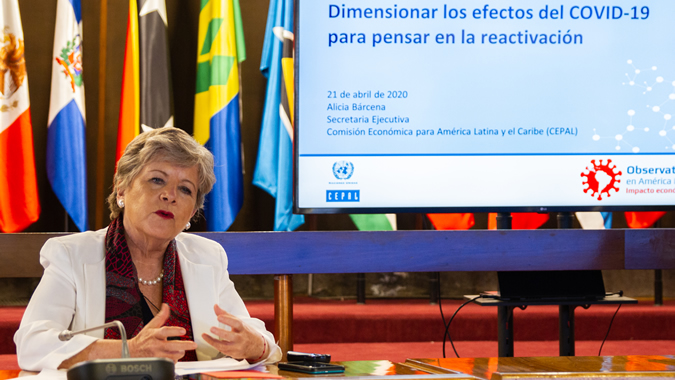COVID-19 Pandemic Puts Us at a Civilizing Crossroads: Either We Return to the Globalization of Concentration, or We Build a Different Future, Alicia Bárcena Indicates
Work area(s)
ECLAC’s Executive Secretary participated today in a webinar organized by the Carolina Foundation of Spain, on multilateral action in Ibero-America in the face of the epidemic.

The coronavirus (COVID-19) pandemic puts us at a civilizing crossroads: either we return to a globalization of concentration that is authoritarian and to the same institutional design, or we build a different future, Alicia Bárcena, Executive Secretary of the Economic Commission for Latin America and the Caribbean (ECLAC), stated today during a virtual seminar organized by the Carolina Foundation of Spain.
The event entitled Multilateral Action in Ibero-America in the Face of COVID-19 was moderated by Cristina Gallach, the Spanish government’s State Secretary for Foreign Affairs and for Ibero-America and the Caribbean. Along with Alicia Bárcena, other participants included Sebastián Nieto, Head of the Latin America and Caribbean Unit within the Development Center of the Organization for Economic Cooperation and Development (OECD); Andrea Costafreda, from the organization Oxfam Intermón; and Pablo Nemiña, an expert from the National Scientific and Technical Research Council (CONICET) and the Latin American Faculty of Social Sciences (FLACSO) in Argentina.
In her remarks, ECLAC’s Executive Secretary affirmed that the world is facing a global public evil, similar in magnitude to climate change, which demands that health be protected. To achieve that, she said, it is necessary to call for a different kind of multilateralism, which addresses the dimension of the crisis we are experiencing.
Alicia Bárcena urged for a radical reformulation of North-South relations and for moving towards a new and more democratic multilateralism that can truly respond to this crisis and to the scenario that will follow the COVID-19 pandemic.
“The multilateralism that exists now is insufficient because it proposes the same solutions as always, offering bilateral responses and not a truly collective solution. Just as the United Nations Secretary-General António Guterres said, I am calling for a debt standstill for all countries, especially middle-income ones, because the majority of them do not have the wherewithal to cope,” she stated.
ECLAC’s most senior representative added that to build a civilizing future, countries must ensure that people have a universal basic income for citizens which, if it were equivalent to an extreme poverty line, would not cost more than 2% of GDP. If sights were set a little higher and income equivalent to a poverty line was contemplated, the cost would reach 4.7% of GDP, a figure below the 6.3% of GDP represented by tax evasion in the region.
“The State’s fiscal scheme must be changed, let’s put public resources into shoring up income. The most important thing to do in this emergency is to protect income, we must protect workers and those who are most vulnerable, including women, who represent 71% of health sector workers,” she sustained.
Alicia Bárcena also expressed confidence that regional integration is the best option for confronting this crisis through the creation of production networks and the diversification of suppliers in terms of countries and companies, privileging locations that are closer to consumption markets and relocating strategic production-related and technological processes in the region.
“After this crisis, the global economy will be regionalized around three poles: Europe, North America and Asia. Latin America and the Caribbean cannot continue depending on the United States at a time when that country is not in cooperation mode. We number nearly 650 million inhabitants and we can protect ourselves to be able to manage the external shocks the region is experiencing, make new industries viable, and promote networks for production and technological research among countries and subregions,” she concluded.
Related content

COVID-19 Pandemic Will Lead to the Biggest Contraction in Economic Activity in the Region’s History: A -5.3% Drop in 2020
ECLAC released new growth projections for Latin American and Caribbean countries. It underscores that in the medium term, this crisis will provoke structural changes in the organization of production…
Related link(s)
Country(ies)
- Latin America and the Caribbean
Contact
Public Information Unit
- prensa@cepal.org
- (56 2) 2210 2040